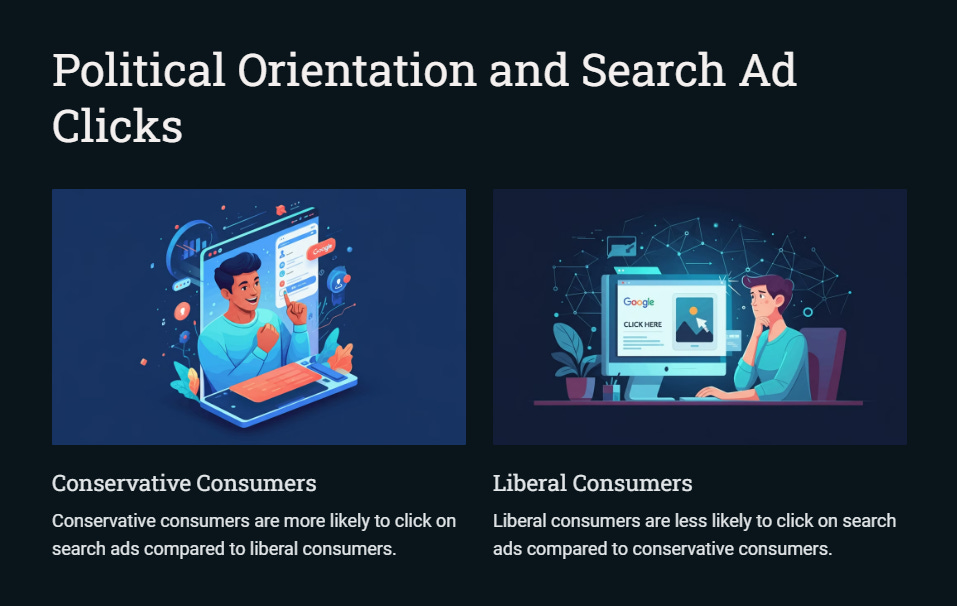Source:
Davidson, A. (2024). Countering Search Ad Avoidance: How Political Orientation Affects Trust in Search Advertising. Journal of Advertising, 1–17. https://doi.org/10.1080/00913367.2024.2393708
In this episode, we dive into groundbreaking research that uncovers a fascinating connection between consumers' political orientations and their likelihood to click on search ads. This study, published in the Journal of Advertising, reveals how political ideology influences trust in search advertising and offers valuable insights for marketers looking to optimize their search engine marketing strategies.
Key Findings
The Search Ad Avoidance Effect
Definition: Consumers are generally more likely to click on organic search results than paid search ads.
Impact: Click-through rates (CTR) for organic links can be up to 10 times higher than for search ads.
Political Orientation and Search Ad Clicks
Conservative consumers are more likely to click on search ads compared to liberal consumers.
This effect is mediated by higher levels of trust in search advertising among conservatives.
Search Construal and Political Effects
Abstract searches (broad queries) amplify the political orientation effect.
Concrete searches (specific queries) minimize differences between conservatives and liberals.
Trust as a Mediating Factor
Conservatives perceive search ads as more trustworthy, believable, and credible compared to liberals.
This increased trust leads to higher click-through rates among conservative consumers.
Research Methodology
The study employed a mixed-methods approach across four studies:
Analysis of secondary data from Google Merchandise Store analytics
Survey of individual consumers on likelihood to click search ads
Survey measuring trust in search ads as a mediating factor
Online field experiment using real Google search ads
Practical Implications for Marketers
Political Segmentation in Search Campaigns
Consider incorporating political orientation into audience targeting strategies.
Utilize geographic targeting based on voting patterns (e.g., congressional districts) to reach more conservative audiences.
Optimizing for Abstract vs. Concrete Searches
For broad, abstract searches:
Allocate more budget to conservative-leaning segments
Create ad copy that emphasizes trustworthiness for liberal-leaning segments
For specific, concrete searches:
Maintain consistent budgets across political segments
Focus on addressing the specific query intent regardless of political orientation
Building Trust in Search Ads
Incorporate trust signals in ad copy (e.g., certifications, ratings)
Emphasize credibility and legitimacy in ad extensions
Consider using sitelink extensions to provide more context and build trust
Balancing Paid and Organic Search Strategies
Maintain strong SEO efforts, especially when targeting liberal-leaning audiences
Don't neglect organic search in favor of paid ads, even with improvements in AI-driven ad optimization
Adapting to Different Stages of the Customer Journey
Early stages (abstract searches): Leverage political orientation insights
Later stages (concrete searches): Focus on addressing specific needs regardless of political leanings
Theoretical Contributions
Expansion of Ad Avoidance Research
Introduces the concept of "search ad avoidance effect" to the advertising literature
Demonstrates that ad avoidance extends beyond invasive formats to search ads
System Justification Theory in Digital Marketing
Shows how conservative ideology leads to greater trust in sponsored content
Extends understanding of system justification to online search behavior
Construal Level Theory and Political Orientation
Reveals how abstract vs. concrete mindsets interact with political ideology in search behavior
Provides insights into when core values influence consumer decisions
Limitations and Future Research Directions
Purchase Behavior: Study focused on clicks, not conversions or purchases
Alternative Explanations: Need for eye-tracking studies to confirm attention patterns
Media Literacy: Potential influence of education level and search engine familiarity
Trust in "Big Tech": Possible impact of distrust in search algorithms among conservatives
Other Search Engines: Study focused on Google; results may vary on other platforms
This research provides valuable insights for search marketers, highlighting the importance of considering political orientation in search ad strategies. By understanding how ideology influences trust and click behavior, marketers can better optimize their campaigns, especially for broad, abstract searches. However, it's crucial to remember that these effects diminish for specific, concrete queries, emphasizing the need for a nuanced approach to search marketing that considers both political orientation and search intent.
By leveraging these insights, marketers can develop more targeted and effective search advertising campaigns, ultimately improving ROI and better serving consumers across the political spectrum.
Interactive Quizlet: https://quizlet.com/study-guides/political-ideology-s-impact-on-search-ad-clicks-5ba943f9-e2f0-4dfb-b10d-d82f223ef69c?i=3i62em&x=13qt













